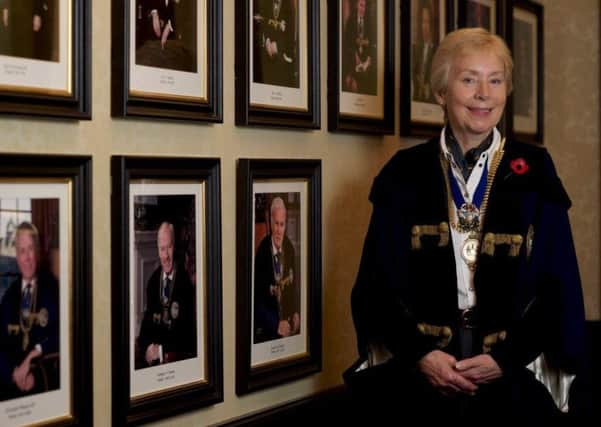Pat Denzler on becoming Master of historic Merchant Company


Founded initially to protect trading rights in the city, the organisation now acts as both a champion for business and as a charitable foundation, sticking to its founding principles of helping needy young and old people in Edinburgh and the Lothians.
Mrs Denzler is the second female – and first non-royal female – to take on the master role for the organisation, whose honorary members include Winston Churchill, Andrew Carnegie and the Queen.
Advertisement
Hide AdAdvertisement
Hide AdThe Merchant Company’s main headquarters can be found in an unassuming building, tucked away in the city’s Hanover Street.
So unassuming in fact you could easily walk past it without a second glance, but inside it protects a treasure trove of historic relics, priceless works of arts, busts of previous benefactors and books containing the signatures of the company’s masters – dating back to 1681.
And it maintains much of its 17th century traditions, helping people from disadvantaged backgrounds receive a good education, and supporting elderly people in the city through its numerous initiatives and bursary schemes.
Members can sit on various committees to help manage the organisation’s charitable works, as well as the many trusts bequested to the company.
Advertisement
Hide AdAdvertisement
Hide AdSome stipulations on trusts can seem almost archaic, including a fund that can help women over 55, but only if they are deemed to be of “good character”.
“We have a lot of little charities, which quite often are very strict about who shall benefit from it, so you have to be careful to read it,” Mrs Denzler explained.
“Sometimes they have to be at a particular school in the last three years, or they have to be in trade and have a certain number, a certain name. But we have one of our members working on that to see how they can link them together and make them more user friendly.”
But not all the company’s rules have stood the test of time. “In the early days there were fines that all helped swell the donations, for swearing or misbehaving,” she added.
Advertisement
Hide AdAdvertisement
Hide AdThe history of women in the organisation is a complex one, currently just under 10 per cent of the 540 members are female.
Mrs Denzler said: “At that first meeting it is not clear, but I understand they were all men, but within ten years women had joined and curiously all the women could sign their names, they were literate, whereas some of the men, the merchants weren’t able to.
“They had to be a burgess so they were in trade, they were selling, buying, some of them were widows and when their husband died had taken over the business. Perhaps they had already been running it, but now they were formally the owners. That sort of gradually lapsed for some reason and it became out of fashion.
“It wasn’t until (businesswoman) Dawn Burrows, who had been in Edinburgh, was keen to join but said ‘is there any restriction?’ and they looked and there was no restriction so she became the first female member in the early 1990s.”
Advertisement
Hide AdAdvertisement
Hide AdMrs Denzler said she was keen during her tenure to encourage more women into the organisation.
“It’s growing since the 1990s, it’s coming up towards near the 10 per cent mark, and we do have some outstanding female members.”
The only other female who has taken on the role of master was the Princess Royal, who was very active in her role in 2002, her father, the Duke of Edinburgh, carried the same title in 1965. “She seemed very interested in it, very well informed, ” Mrs Denzler explained. “We did have quite a lot of security, sniffer dogs and all sorts of extra things, it was really quite interesting. She did have a fantastic dinner, which was a fundraiser for a charity for young people.”
Despite keeping much of its traditions and ceremonies, the organisation is keen to continue to grow and move with the times. One current scheme is an enterprise award, open to school children aged 13 to 18 in Edinburgh and the Lothians.
The purpose of the award is to encourage, business acumen, charitable endeavour and initiative. Winners are rewarded with up to £500.